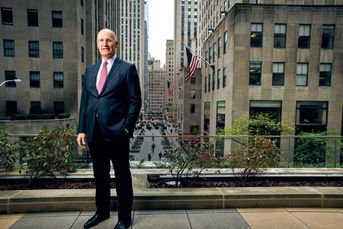What is shaping the advice business of tomorrow?

InvestmentNews gathered the profession's up and coming leaders to identify key drivers of change and offer a glimpse into financial advisers' future.
The future is already here, according to science-fiction writer William Gibson, who noted, “it’s just not very evenly distributed.”
His insightful perspective on how we should view what’s coming next, made nearly a quarter century ago, is particularly apt for today’s financial advice business.
Barring unforeseen natural or manmade disasters, or black swan economic or market events that could twist tomorrow in unknown ways, most advisers seek to understand the leading-edge forces that will shape their future. To gather such insights, InvestmentNews invited alumni from all five years of its 40 Under 40 project — which spotlights next-generation leaders of the profession — for a think tank May 31 in New York called “The Future of Our Business by the Future of our Business,” sponsored by Fidelity Investments. Three key drivers the adviser participants agreed are already changing the shape of their profession are technology in its many forms, demographics and greater transparency.
Precisely how the three will alter what is coming over the horizon is where the question marks lie, of course. But think tank attendees offered clear views on what is most likely to happen over the next three to five years.
(More: 11 adviser predictions from the Future of Our Business)
While technology is the overwhelming driver, none of the advisers foresees a “super robo” solving client problems algorithmically and with empathy and human insight, like a financial version of the HAL 9000 computer in “2001: A Space Odyssey.” Instead, technology is seen as replacing more and more of the many repetitive and administrative tasks associated with providing advice, as well as traditionally higher-order but mechanical jobs such as portfolio allocation and rebalancing, enabling advisers to provide more efficient, higher-touch service to more clients.
AI, automated planning
“Technology is enhancing the ability of good advisers to do an even better job for their clients,” said Christopher Griffith, senior vice president of wealth management with the Griffith Wheelwright Group at Morgan Stanley and an alumnus of the 2018 class of 40 Under 40.
“My having access to AI, automated financial planning and other tech tools that I can use as an adviser is a great advantage for our high-net-worth clients,” he said.
“For instance, we run an AI program that sends me an email every day suggesting my daily activities,” Mr. Griffith said. “I give each suggestion a thumbs up or a thumbs down, so the system learns my preferences. It also lets me click a button to execute ideas for clients; the technology helps me be more in touch.”
 “As clients live longer, advisers are going to have to consider financial independence … in a different way.” Katherine Liola founder and president Concentric Private Wealth
“As clients live longer, advisers are going to have to consider financial independence … in a different way.” Katherine Liola founder and president Concentric Private WealthStephen Rischall, who identifies himself as a “technologist and financial geek” on his website, said technology was the catalyst that led him to leave a hybrid firm three years ago.
“By being able to use technology more effectively, I saw lots of opportunities to create a better client experience and market more effectively, as well as bring down costs,” said Mr. Rischall, co-founder of 1080 Financial Group and part of the 2016 class.
Mr. Rischall said that by automating most processes, continually communicating with clients in mobile-friendly ways and via video, and building an online presence, his planning firm has been able to attract clients rather quickly. He sees technology enabling more firms to do the same. In fact, as other advisers noted, technology-powered productivity enhancement is likely to help the industry compensate for the expected shrinkage in advisers over the next several years due to retirement.
The aging of the adviser force is one of several current demographic trends — among them, increasing longevity and the rise of millennials — that will shape the future of the business. Awareness of greater longevity in the more affluent strata of society that constitutes the main market for financial advisory services is already spurring changes in investment products, portfolio design and retirement planning.
“As clients live longer, advisers are going to have to consider financial independence — a term I prefer to ‘retirement’ — in a different way,” said Katherine Liola, founder and president of Concentric Private Wealth and an alumna of the 2014 class. “We will have to be able to suggest ways of producing sustainable streams of income that come not just through investments or real estate, but maybe from something enjoyable that people do on the side or from working longer.”
Investment services, choices
In addition to baby boomer clients and a concern for sustainable income throughout life, the growing cohort of millennials and younger investors are influencing investment services and choices.
“In order to engage the children and grandchildren of our clients, advisers will have to focus more on planning services until the next generation builds wealth,” said Anne McCabe Triana, president and CEO of Curo Private Wealth and part of the 2017 class. “The challenge is still running a profitable business, and the key to that is leveraging technology to offer tiers of service with differing levels of advice.”
Matthew Ramer, principal of MOR Wealth Management and a member of the 2014 class, believes young clients also will compel advisers to become more interested in and knowledgeable about SRI.
“Socially responsible investing is likely to become the default choice among younger investors,” he said.
Fee transparency
Next-generation investors also tend to attach importance to transparency, especially regarding price, although technology and media attention surrounding the Department of Labor’s fiduciary rule have heightened awareness of advisory costs among all investors, advisers at the think tank said.
“When our marketing firm asked clients for their view of our new hourly and flat-fee management pricing approach, everyone said they liked it because it was simple,” said Randy Bruns, founder of financial planning firm Model Wealth, and alumnus from 2018. “One client said that price wasn’t the issue, it was that for the first time they understood what they were paying for and saw its value.”
Younger or older, seekers of financial advice tend to want a person to talk to.
“While many younger investors like doing things on their own, a large percentage craves advice and counseling,” Mr. Ramer said.
Mr. Rischall agreed.
“They may find us online and check us out, but 90% of those who become our clients want to come in first and talk with us,” he said. “After that, all digital is OK.”
Evan Cooper is a freelance writer.
Learn more about reprints and licensing for this article.







